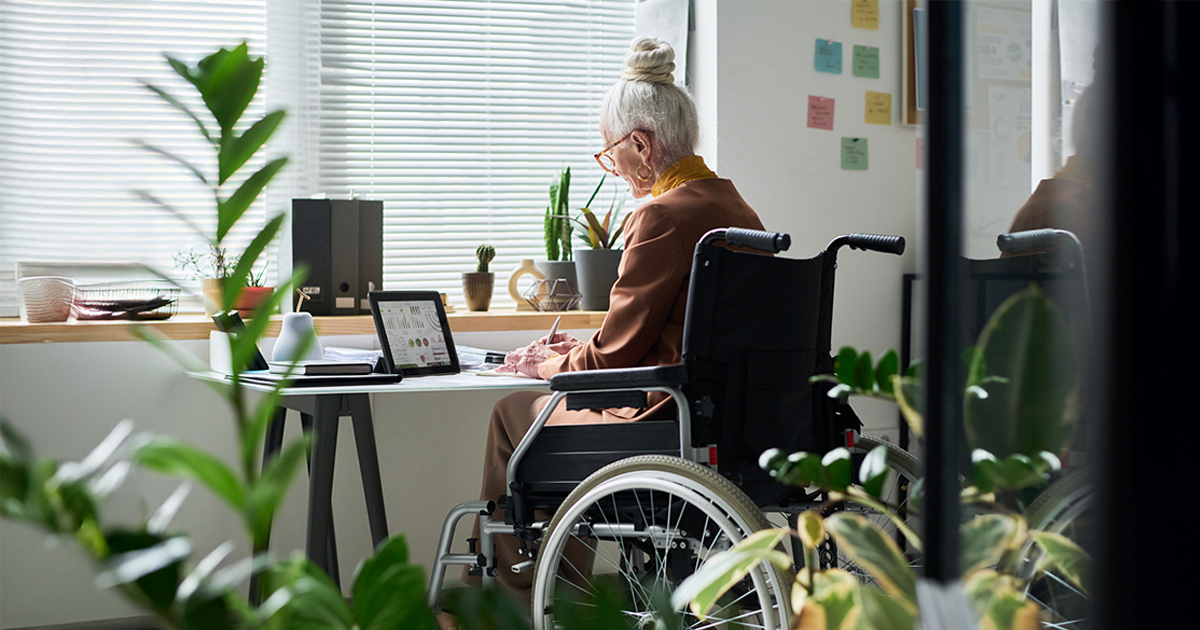There’s a level of pride that comes with being self-sufficient. Research shows that feeling independent and having the ability to make decisions for ourselves supports our well-being.1
By the time we’re adults, we have the freedom to make our own choices. It gives us a sense of control. And it allows us to express our interests and values.
Sometimes life changes can make you more reliant on others. An illness might limit your mobility over time. A sudden job loss might prompt you to move in with a friend. And, of course, there’s the normal process of aging.
Shifts like these can be hard to process, especially if they’re sudden. Studies show that not being able to take care of our own basic needs can negatively affect a person’s mental health.2
“Our identities and self-worth are shaped by the ways we exert our independence,” says Giselle Alexander, LCSW, a licensed therapist and AbleTo Program Advisor. “Any departure from the life we’ve built for ourselves can trigger a lot of emotions.”
Adjusting to change starts with making peace with your new normal. Then you can start to find a path forward while finding ways to stay true to who you are. Below, we’ll share ideas for doing just that.

Achieve your mental wellness goals
AbleTo programs give you 24/7 access to tools, activities, and content tailored to your needs. Sign up or log in to start exploring.

Why losing your independence feels so tough
Losing autonomy comes with challenges. First, there’s logistics. If you’ve lost mobility, you may need physical support devices. Or you may need someone to help you get around. If you’ve lost the ability to speak, you have to figure out a new way to express yourself.
Then there’s the mental and emotional side. “Self-reliance gives us a sense of dignity,” says Alexander. “When we feel capable, we tend to see ourselves in a more positive light.”
Asking for or accepting help can feel uncomfortable. And research shows that when we lose independence, it can shake our confidence, too.3 “You have to come to grips with the fact that your life is different,” says Alexander. “You may need support in ways you didn’t previously.”
When the loss happens and whether we’ve had time to prepare can also impact how we cope. “If the loss happens when someone is older, they likely had time to plan,” says Alexander. “That’s not the case if the loss is sudden. Someone young or middle-aged may also feel a loss of potential. They may grieve for things they wanted for their lives but hadn’t yet pursued.”
3 ways to stay true to yourself
Adjusting to change can leave you feeling a little unmoored. But it’s possible to feel more empowered, even if you can’t be as independent as you were before. Give these tips a shot.
Ground yourself in the present
When we’re struggling with change, it can be tempting to look to the past or future. But wishing for a different version of life doesn’t help you figure out what you need to feel better now.
Instead, aim for radical acceptance, says Alexander. “You don’t have to like your current situation,” she explains. “But coming to terms with where you are at this specific moment can help you start to accept the new version of you. And it gives you a realistic baseline to figure out what steps you can take to move forward.”
Difficult emotions can make it hard to stay present and reach that point of acceptance. But there are tools to help you work through your discomfort. A short guided meditation can help you give yourself the space to feel sadness. Or you might try one that focuses on building self-compassion. (AbleTo participants will find both in our self-care app.)
Build mental flexibility
It’s easy to get attached to how you’ve done things in the past. After all, there’s a sense of ease that comes with predictability and habits.
Becoming less independent often means having to approach familiar tasks and hobbies differently. And to do that, you need to shift your mindset.
For example, let’s say you were a very active person who recently had a stroke or an accident. You might’ve enjoyed running or dance classes. Now you need a walker or a wheelchair to get around now. It likely feels frustrating to depend on those things.
“One technique we use in cognitive behavioral therapy is called the ABC approach,” says Alexander.
Here’s how it works:
- Accumulate positive emotions. This means engaging in things that you enjoy. This gives you a reservoir of good feelings to tap into when things feel tough.
- Build mastery. Working toward a goal gives you something positive to focus on. In the example above, it might be physical therapy sessions. Or it could be another activity that helps you move more slowly.
- Cope ahead of time. Think about how you might deal with stressful events. Then practice those skills in advance. Knowing that you can handle a tricky situation can help boost your confidence.
Connect with what you love
Your current reality may not look like what you had expected or hoped for. That doesn’t mean you can’t adapt. You can find new ways to connect with the things and people that make you feel like you.
“Now is the time to get curious,” says Alexander. “You may not be able to do something exactly as you’d planned, but how close can you get? Can it take a slightly different form?”
If you loved going out to socialize but you’re unable to drive, maybe friends or family could pick you up. Or perhaps you could join a hobby group that meets online. If you have trouble with your eyesight, audiobooks can be a great choice.
You may need to get creative to find the right solution. And you may need extra help from loved ones. An aide or other type of caring professional can also lend a hand. But it’s worth the effort to stay in touch with the things that feed your soul.
Give yourself grace
Losing any degree of independence can be hard to process. There can be a lot of adjustments to make on a physical and emotional level. But you can begin to find your new normal by acknowledging what has happened. You can find ways to express your sense of self, even if they look a little different. And you can find support when you’re ready.
Need some support?
AbleTo is here to help. From on-demand self care to virtual therapy and coaching, we make managing your mental wellness easy. Sign up and get the personalized support you deserve.
By Sarah Bruning
Sarah Bruning has been a journalist and content strategist for more than 15 years. Her work has appeared in leading publications including Women’s Health, Travel + Leisure, and Cosmopolitan.
Clinically reviewed by Kelli McElhinny, LCSW, a licensed therapist and AbleTo Clinical Content Producer.
Photos by shironosov/iStock. Stock photo. Posed by model.
The information featured on this site is general in nature. The site provides health information designed to complement your personal health management. It does not provide medical advice or health services and is not meant to replace professional advice or imply coverage of specific clinical services or products. The inclusion of links to other websites does not imply any endorsement of the material on such websites.
Sources
1. De-Juanas Á, Bernal Romero T, Goig R. The Relationship Between Psychological Well-Being and Autonomy in Young People According to Age. Frontiers in Psychology. 2020;11(1). doi:https://doi.org/10.3389/fpsyg.2020.559976
2. Albanese AM, Bartz‐Overman C, Parikh, MD T, Thielke SM. Associations Between Activities of Daily Living Independence and Mental Health Status Among Medicare Managed Care Patients. Journal of the American Geriatrics Society. 2020;68(6):1301-1306. doi:https://doi.org/10.1111/jgs.16423
3. Ryszewska-Łabędzka D, Tobis S, Kropińska S, Wieczorowska-Tobis K, Talarska D. The Association of Self-Esteem with the Level of Independent Functioning and the Primary Demographic Factors in Persons over 60 Years of Age. International Journal of Environmental Research and Public Health. 2022; 19(4):1996. https://doi.org/10.3390/ijerph19041996


